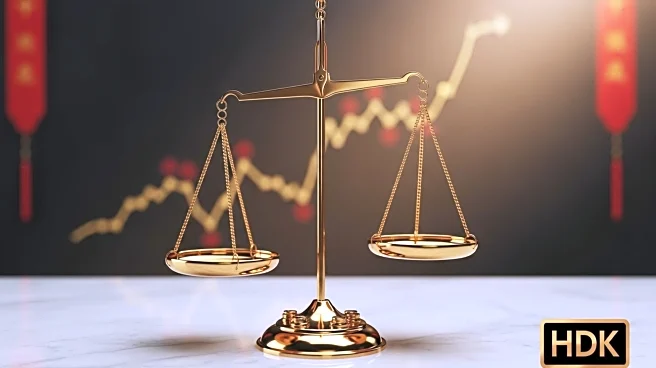What is the story about?
What's Happening?
LVMH Moët Hennessy Louis Vuitton, the world's largest luxury group, reported a 1% organic sales increase in the third quarter of 2025, surpassing market expectations. Despite a 4% decline in reported revenues due to strong currency impacts on tourist spending, the company saw improvements in its fashion and leather goods division, particularly with brands like Louis Vuitton and Dior. The growth was driven by increased local customer traffic in China. LVMH's Chief Financial Officer, Cécile Cabanis, noted that while the company is seeing 'pockets of excitement' from new retail concepts and designer debuts, challenges remain due to currency impacts and a tougher comparison basis in the U.S. for the fourth quarter.
Why It's Important?
The positive sales growth for LVMH is significant as it indicates a potential recovery in the luxury market, particularly in China, which is a key region for luxury sales. The company's ability to exceed expectations despite currency challenges suggests resilience and adaptability in its business strategy. This development is crucial for stakeholders in the luxury industry, as it may signal a broader recovery trend and influence investor confidence. The performance of LVMH could also impact other luxury brands and retailers, as they navigate similar market conditions and consumer behavior shifts.
What's Next?
LVMH plans to implement moderate price increases in the U.S. to offset tariffs on European Union exports. The company is also preparing for new product launches and store openings, which are expected to drive further growth. The introduction of new creative directors and product categories, such as cosmetics at Vuitton, will likely contribute to continued momentum. Analysts have raised their outlook for LVMH's stock, anticipating potential reversals of industry headwinds in the coming year. However, ongoing macroeconomic uncertainties and shifting consumer preferences remain challenges that LVMH will need to address.
Beyond the Headlines
The strategic moves by LVMH, including new store openings and product innovations, reflect a broader trend in the luxury industry towards experiential retail and brand elevation. The company's focus on local customer engagement and brand desirability highlights the importance of adapting to changing consumer tastes and preferences. Additionally, the impact of currency fluctuations and tariffs underscores the complex global economic environment luxury brands must navigate.















